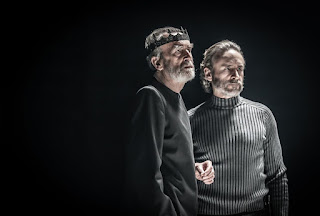On the other hand I know the technology, at least the version of it I've seen used before, involves creating the soundscape around a single high tech microphone that stands in for the audience's ears, and I wasn't sure how well that would translate to a full-cast play.
As I suggested, the results never quite felt like they used the sound to the full effect of making the audience feel in the middle of an unpredictable, sinister landscape, although there are times when it helps create atmosphere: Gareth Fry's sound design is largely used to bring intimacy as the characters can whisper into the audience's ears, and is also particularly fond of having the many birds who serve as ominous harbingers fly around our heads. Much of the supernatural is rendered as invisible, beginning with the Wayward Sisters. Wait, Wayward? On the one hand it's a nice alternative reading, on the other it sometimes sounds like someone's slurring the word "weird."
So these whispering, giggling voices surround Macbeth and Banquo (Cal MacAninch) and promise them greatness - for Macbeth big things will come to him soon, for Banquo it will be generations of his heirs who inherit the kingdom. Macbeth and his wife decide to take the prophecy to heart and speed it up, by murdering King Duncan (Benny Young) and positioning themselves in the right place to divert suspicion and take his crown.
With the focus on the sounds, the visuals are simpler - Rosanna Vize's design is monochrome, with the characters mostly dressed in modern kilted suits. I found a lot of Webster's blocking visually dull, with occasional sparks of flair, like the ghostly supporting cast banging on the glass back wall for the Porter scene (Jatinder Singh Randhawa's Porter gets to largely go off-script for this, which means the scene actually does serve as the comic interlude in an otherwise grim evening.)
Generally Webster's production is stronger on brisk, confident storytelling than on creating a distinct identity for itself: The sound design is used to turn some of the more laborious exposition scenes into a mass of chatter where the salient points come through; scenes of post-battle celebration help establish the hierarchy and give us a glimpse of the Macduffs (Noof Ousellam and Rona Morison) together before the play suddenly asks us to care about them; there's good buildup to the final battle and it all adds to an evening that's short at two hours and still feels shorter.
The leads' characterisation is a game of two halves, with neither of them really making a stamp on their characters before the regicide. Jumbo being the only English actor in an otherwise Scottish cast is apparently a conscious decision, but I can't say there's any sense of Lady Macbeth being an outsider before she bceomes queen. I guess what we're getting is a couple with very little agency, who act impulsively because they think a supernatural message told them to, and then have to deal with the consequences once it's done. (Always worth noting that at the point when they decide to completely give up their lives to their prophecies, the Weirdward Sisters haven't made a single correct prediction of the future; the Thane of Cawdor news was announced in the previous scene, so arguably they've just heard some hot goss before Macbeth has.)
In the second half they settle more confidently into their roles, with both following their characters' descent into madness: For Jumbo this is turned in on herself, for Tennant it turns outward into more violence and villainy, with this Macbeth particularly keen on taking an active part in killing children (all played by Raffi Phillips, alternating with Casper Knopf.) It contributes to a stronger final hour in a production that ends up good-but-not-great, one where the focus is clearly heavily on the sound design, which ends up making a contribution but not necessarily wowing in the way that might be expected.
Macbeth by William Shakespeare is booking until the 10th of February at the Donmar Warehouse (returns only.)
Running time: 2 hours straight through.
Photo credit: Marc Brenner.







No comments:
Post a Comment